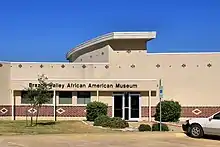History of African Americans in Texas
African American Texans or Black Texans are residents of the state of Texas who are of African ancestry and people that have origins as African-American slaves. African Americans formed a unique ethnic identity in Texas while facing the problems of societal and institutional discrimination as well as colorism for many years. The first person of African heritage to arrive in Texas was Estevanico, who came to Texas in 1528.[4]
| Part of a series on |
| Ethnicity in Texas |
|---|
|
|
|
| Total population | |
|---|---|
| 3,444,712[1] (2020) | |
| Regions with significant populations | |
| Ark-La-Tex, Central Texas, East Texas, Galveston, Greater Austin, Greater Houston, Beaumont–Port Arthur metropolitan area, Dallas–Fort Worth metropolitan area, Greater San Antonio,[2] North Texas, Northeast Texas, Southeast Texas | |
| Languages | |
| Texan English, Southern American English, Louisiana Creole, African-American Vernacular English, African languages | |
| Religion | |
| Black Protestant, Roman Catholicism, Hoodoo (spirituality), Louisiana Voodoo[3] | |
| Related ethnic groups | |
| Other Black Southerners especially Black Louisianians and Black Oklahomans, Afro-Mexicans, Blaxicans in Texas, White Americans in Texas, Louisiana Creoles in Texas |
| Part of a series on |
| African Americans |
|---|
|

The earliest black residents in Texas were Afro-Mexican slaves brought by the Spanish.[5]
A large majority of Black Texans live in the Houston, Dallas-Fort Worth and San Antonio metropolitan areas.[6]
The U.S. Census identified the Black population alone, non-Hispanic population at 3,444,712,[1] making Texas the largest African American population in the United States.[7]
History


In 1529, a Moroccan Muslim man named Estevanico became the first African to come to Texas. He was from Morocco, and was sold into slavery to a Spanish explorer. Arriving in the New World, Estevanico and the rest of his party (including Cabeza de Vaca) were shipwrecked near Galveston Island, captured by a group of Coahuiltecan Native Americans, escaped, and trekked across what is now Texas and northern Mexico. He was killed later while traveling to the state of New Mexico.[8]
The first Africans that lived in Texas were Afro-Mexicans when Texas was still a part of Mexico before the Mexican–American War. Enslaved Africans arrived in 1528 in Spanish Texas.[9] In 1792, there were 34 blacks and 414 mulattos in Spanish Texas.[10] Anglo white immigration into Mexican Texas in the 1820s brought an increased numbers of enslaved people.[11]
Most slaves in Texas were brought by white families from the south. Some enslaved blacks came through the domestic slave trade, which was centered in the city of New Orleans. Most enslaved blacks in Texas were forced into unskilled labor as field hands in the production of cotton, corn, and sugar. Some other enslaved blacks lived and worked on large plantations and in urban areas where they engaged in more skilled forms of labor such as cooks, blacksmiths, and carpenters.[12]
African Americans are the racial minority in Texas. Their proportion of the population has declined since the early 20th century after many left the state in the Great Migration. Blacks of both Hispanic and non-Hispanic origin made up 11.5 percent of the population in 2015; blacks of non-Hispanic origin formed 11.3 percent of the populace. African Americans of both Hispanic and non-Hispanic origin numbered roughly 2.7 million individuals, increasing in 2018 to 3,908,287.[13] The majority of the Black and African American population of Texas lives in the Greater Houston, Dallas and San Antonio metropolitan areas.[2]
Population
Many African Americans in Texas remained in slavery until after the U.S. Civil War ended. There was scarce Union Army activity in Texas, preventing them from joining the Northern Army. Some escaped over the borders to areas where the Union Army was operating. The announcement of emancipation was delayed until June 19, 1865, when officials announced that slavery had been formally abolished. It was celebrated first in Texas as Juneteenth. Juneteenth was celebrated in many African American Communities throughout the United States, it was not until 156 years later in 2021, it became a Federally Nationally recognized Holiday. African Americans left Texas by the tens of thousands during the Great Migration in the first half of the 20th century, seeking work and political opportunities elsewhere. As of the 2020 U.S. Census, African Americans were 11.8% of the state's population which mirrors the national average of 12.1%. The long-term effects of slavery can be seen to be present in the state's demographics. The eastern quarter of the state, where cotton production depended on thousands of slaves, is the westernmost extension of the Deep South and contains a very significant number of Texas' African-American population.[4]
Texas has the largest African-American population in the country.[14] African Americans are concentrated in eastern, east-central and northern Texas, as well as the Houston, Dallas-Fort Worth and San Antonio metropolitan areas.[15] African Americans form 24 percent of both the cities of Dallas and Houston, 19% of Fort Worth, 8.1 percent of Austin, and 7.5 percent of San Antonio.[2] The African American population in Texas is increasing due to the New Great Migration.[14][15]
A 2014 University of Texas at Austin study observed that the state's capital city of Austin was the only U.S. city with a high growth rate that was nevertheless losing African Americans, due to suburbanization and gentrification.[16]
In 2018, African-Americans had the second highest net growth in population in Texas compared to 2010. Harris County accounted for the largest percentage of that growth.[17] Harris County's largest city Houston is now known as a center of African-American political power, education, economic prosperity, and culture, often called the next black mecca.[18]
There is a black Louisiana Creole community in Texas.[19]
Historically black colleges and universities in Texas
There are nine historically black colleges and universities (HBCUs) in Texas. Texas Southern University (largest) and Prairie View A&M University (second largest) are the two most notable HBCUs in Texas and annually produce a significant portion of college degreed African-American in the state. The schools are also major SWAC sports rivals.[20][21] St. Philip's College is a public community college located in San Antonio, accredited by the Southern Association of Colleges and Schools. It is the westernmost HBCU in the United States.
Notable Black Texans

See also
- History of African Americans in Austin
- History of African Americans in Houston
- History of African Americans in Dallas–Fort Worth
- History of African Americans in San Antonio
- History of Nigerian Americans in Dallas–Fort Worth
- German Texan
- History of Mexican Americans in Texas
- Jewish history in Texas
- Estevanico
- Juneteenth
- Sweatt v. Painter
- Ivy Taylor
- J. California Cooper
- Barbara Jordan
- Joe Lockridge
- Ntozake Shange
- Afro-Mexicans
- Spanish Texas
- History of slavery in Texas
- Demographics of Texas
- Hispanics and Latinos in Texas
- African Americans in Oklahoma
- African Americans in Louisiana
- African Americans in Arkansas
- Black Southerners
- List of African-American historic places in Texas
- List of African-American newspapers in Texas
References
- "P2 HISPANIC OR LATINO, AND NOT HISPANIC OR LATINO BY RACE – 2020: DEC Redistricting Data (PL 94-171) – United States by State and Territory". United States Census Bureau.
- "How the Eastside Became Home to San Antonio's Black Community". San Antonio Report. 2018-01-15. Retrieved 2020-12-14.
- "Religious Landscape Study".
- Dulaney, W. Marvin (July 25, 2016) [June 9, 2010]. "African Americans". Handbook of Texas (online ed.). Texas State Historical Association.
- "The Emergence of Afro-Tejano Society During the Spanish Colonial Period in Texas, 1528-1700".
- "Texas".
- "The Growing Diversity of Black America". 25 March 2021.
- https://texancultures.utsa.edu/wp-content/uploads/2020/02/TOA_African-American_Revised_VI.pdf
- "The African American Story | Texas State History Museum". www.thestoryoftexas.com. Retrieved 2021-05-30.
- "TSHA | African Americans". www.tshaonline.org.
- A Lasting Legacy - Texas Historical Commission
- The African American Story
- "American Community Survey 2018 Demographic and Housing Estimates". data.census.gov. Retrieved October 18, 2020.
- Frey, William H. (May 2004). The New Great Migration: Black Americans' Return to the South, 1965–2000 (Report). The Brookings Institution. p. 1. Archived (PDF) from the original on April 28, 2008.
- "Texas". BlackDemographics.com.
- Donahue, Emily and David Brown. "Austin's the Only Fast-Growing City in the Country Losing African-Americans" (Archive). KUT. Moody College of Communication at the University of Texas at Austin, Friday May 16, 2014. Retrieved on May 20, 2014.
- "Texas' Hispanic population is on pace to surpass white residents | The Texas Tribune". 20 June 2019.
- Graves, Earl G. Sr. (December 8, 2016). "Join us in Houston, America's Next Great Black Business Mecca". Black Enterprise. Archived from the original on August 20, 2019. Retrieved September 6, 2019.
- Steptoe, Tyina (December 15, 2015). "When Louisiana Creoles Arrived in Texas, Were They Black or White? | Essay".
- Dean, Richard (January 12, 2020). "Texas Southern fends off Prairie View A&M in rivalry showdown". Chron.
- Radow, Alex (August 26, 2019). "5 things to know about TSU-Prairie View A&M rivalry in annual Labor Day Classic". KPRC.
- "Black Texans Who Shaped Our State and Changed Our Country". texasdemocrats.org. 11 February 2020.
Further reading
- Barr, Alwyn. The African Texans.
- Glasrud, Bruce (March 2014). "Anti-Black Violence in 20th Century East Texas" (PDF). East Texas Historical Journal. - Article 13
- Tang, Eric and Chunhui Ren. "Outlier: The Case of Austin's Declining African-American Population" University of Texas at Austin. May 8, 2014. Archive of old URL.
- Hoffberger, Chase (2014-11-03). "The Case of Austin's Declining African-American Population". The Austin Chronicle.
- Black Texans: A History of African Americans in Texas, 1528-1995
- The African American Experience in Texas: An Anthology
- African Americans in Central Texas History: From Slavery to Civil Rights
External links
- "African Americans." Handbook of Texas.
- Blacks in Colonial Spanish Texas
- Afro-Mexicans: The History, The Culture, The Presence
- African Presence in Texas